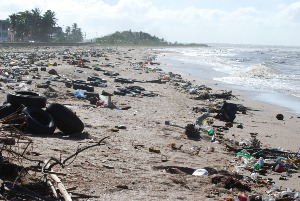
A year after China enacted the National Sword Policy, banning the imports of nearly all kinds of plastic, many nations around the world are still scrambling to figure out how to recycle without shipping everything overseas. China’s National Sword Policy has left large countries, such as the United States and those in the European Union, with the problem of figuring out where to place their recycled goods. Many countries have resorted to either burning the plastic or dumping it in landfills and bodies of water, which pollutes the air, land, and sea.
This Chinese policy decreased the amount of plastic other countries could send to China, which has been handling half of the world’s recyclables for 25 years. While it has caused chaos, the Sword policy is also drawing attention to this major global issue, which is to get the world to become more eco-friendly. There is an increasing amount of contamination in recycled goods, and the lack of people to separate the different kinds of recycled goods (e.g. bins with separated spots for paper, glass and tin, and plastic). Additionally, the influx of more color dyes being used in the products has made it harder and more expensive to recycle them. The policy doesn’t forbid the importing of goods to be recycled, but it does state that unless the goods are at least 99.5% pure, companies aren’t allowed to ship them to China.
Before China’s National Sword Policy was enacted, China was recycling 9% of the world’s plastic, a small number when compared to the 12% burned and the 79% that was dumped in landfills and bodies of water. After the policy, China’s plastic imports dropped 99%, signifying a major global shift in where and how recycled goods are processed. Ever since the implementation of the policy, other South Asian countries have been trying to pick up the slack; however, most of the recycling plants have low budgets and lack proper infrastructure which results in those plants shutting down. Now that neither China nor the other South Asian countries are taking ‘impure’ imports, 111 million tons of plastic need a place to be recycled, or else they will probably end up floating around in the ocean or in the stomachs of ocean animals.
Slowly, other countries are starting to take initiative to help save the Earth. The European Parliament is introducing a ban on single-use plastics. Norway is taxing the makers of single-use plastic unless it is easily recyclable and has a water-soluble label. Britain is taxing manufacturers who use plastic packaging with 30% or less recycled materials. Some cities in the United States have increased the cost of plastic bags at supermarkets, prompting the citizens to bring bags from home. A few displaced Chinese recycling plants are also hoping to move to the United States in a few years time.
While this policy may seem like a negative one, the long-term effects may end up being positive if the rest of the world can collectively come up with a sustainable solution to this problem. China’s National Sword Policy should serve as a wake-up call and a warning to the world, telling everyone to adapt and try to fix this problem before it is too late.
[Source:
WIRED
]

